Despite all the genetic and epigenetic pressures, we don’t get cancer most of our lives because of our immune systems. Cancer is, in essence, a failure of the immune system to regulate abnormal cellular growth.
To understand cancer, you must first understand what cancer is not. Cancer is not a death sentence. Fear, anxiety, anger, and helplessness are all natural reactions when processing a cancer diagnosis. However, allowing these emotions to overcome you is counterproductive to the healing process.
At HHC, our goal is not to help you wage a destructive war against cancer. Instead, we help you rediscover the lost synergy of mind, body, and spirit as they work in tandem to heal you. All we ask from you is hope; do not dwell on what has happened, but rather embrace what you are about to do.
The derangement of the vital force occurs first at the general body level and then it eventually expresses itself at the local level in the form of a neoplasm or growth.
The susceptibility of the individual and his genetic history will predispose him to the disease in general, while the weakness or sensitivity of a part/system will lead to the localization of the disease in that area. The derangement proceeds from the functional to the structural level.
Carcinogenesis
Carcinogenesis or oncogenesis is a process by which normal cells are transformed into cancer cells. It is characterized by a series of changes.
Predisposition / Fundamental cause:Each individual is born with a predisposition which inclines him toward a particular illness (in this case, malignancy). This predisposition can be determined by a study of the patient’s past history and family history.
It has been observed by several homoeopaths, viz. Kent, Roberts, Charles Wheeler, Foubister, Kasad that the cancer patient usually has a very strong family history or past history of cancer, tuberculosis or diabetes mellitus.
Disposition:The individual who is thus born with a predisposition interacts with the environment thereby evolving mental and physical attributes which together form the disposition.
Diathesis:Diathesis is the phase wherein the individual has a strong tendency to develop a particular disease and during which a stressful environmental stimulus initiates the onset of the disease. An awareness and avoidance of probable environmental carcinogens can delay the onset of disease.
Disease Pre-clinical phase:the phase that extends from the inception of cancer to the time that it produces recognizable signs and/or symptoms.It takes several years after the onset of cancer for the cancer to bother an individual or come to the attention of the doctor. The pre-clinical phase may last from 2 – 17 years.
The pre-clinical phase also gives ample opportunity to the primary tumor cells to metastasize. Thus, by the time a tumor is detected there may already be widespread metastasis, or the metastasis may be detected before the detection of the primary tumor, which may at times remain undetected till the death of the patient.
This pre-clinical phase may be totally asymptomatic or certain general symptoms may be thrown up by the deranged vital force.
Clinical Phase:It is the phase where the disease expresses itself overtly through signs and/or symptoms.This phase is therefore the tip of the ice-berg and it would be grossly wrong to consider it as the entire disease.
Widely nicknamed “cut, burn, and poison,” therapies, conventional treatments refer to surgery, radiation, and chemotherapy. These therapies have been the treatment standard for several decades. Despite wide application, these methods are notorious for lacking long-term effectiveness and are associated with several serious side effects. Although initial tumor size reduction may give patients an illusory sense of security, these methods don’t treat the root of cancer. Often, they result in the disease returning in more resistant and aggressive forms.
Even after decades of research and abundant monetary investment, conventional cancer treatment (surgery, chemotherapy, radiation) is still a long way from reaching its desired goal. On the contrary, cancer incidence and mortality have continued to see a steady and dramatic rise.
Because cancer treatment damages healthy cells and tissues as well as cancerous ones, it often causes side effects. Apart from the better-apublicised potential side such as nausea, hair loss, weight loss and weakness, there are a number of possible and very serious clinical complications you should be aware of before determining which treatment option is best suited for you.
Please note that this list of potential side effects is not exhaustive.
Radiation Side effects
Chemotherapy side effects
Alternative Cancer Treatments
By nature, the word “alternative” implies a different option. Ranging from ancient and time-tested practices to modern techniques on the cutting-edge of technology, alternative cancer treatments kill cancer cells but don’t cause toxicity. This approach developed as a result of the negative side effects and inefficiency associated with conventional methods. Not all alternative therapies are nature-made, but natural ingredients are an essential component of this approach. As a result, patients often enjoy a better quality of life during and after treatment when compared to conventional regimens.
Integrative Cancer Treatments
As suggested by the name, integrative cancer therapies combine conventional medicine with their more natural counterparts in hopes of improving effectiveness, reducing side effects, and improving quality of life.
What Are Alternative / Integrative / Conventional Therapies?
In the medical world, the terms alternative, integrative, and conventional often take on different meanings.
To understand the homeopathic approach to treating people with cancer, we must first clarify that homeopathic medicines not only treat the cancer but more importantly they treat the person with this cancer. The natural remedies individually prescribed, on the basis of the totality of a person’s physical and psychological symptoms, reduce that person’s susceptibility to disease. Once this concept is understood it becomes very easy to assist patients.
Homoeopathic medicines not only help to control the growth of cancer (if brought to the homoeopath in the early stages) but they also help to alleviate the other accompanying symptoms like loss of weight, difficulty in eating, pain, weakness, cough, etc.
Following are some of the aspects of Cancer management with Homeopathy:
One of the most distressing complaints associated with some varieties of Cancer is the agonizing pain. Conventional medicines can provide pain relief but only to a certain extent and these medicines are not without any side effects. Moreover there is always a restriction to the dosage that can be safely administered to the patient. The advantage of administering Homeopathic medicines in such cases is that there can be effective pain control without inducing any side effects.
Homeopathy can help in improving the general well being and vitality of the patient.
Conventional treatment options for cancer (chemotherapy, radiotherapy, etc) are associated with distressing side effects and homeopathy can play a definitive role to counter these side effects.
The diagnosis of cancer often leaves the patient with a sense of depression, anxiety and fear. The treatment may induce additional irritability, impatience and mood fluctuations. Homeopathy can influence the psyche of the patient and help him to deal with these emotions in a better way.
Homeopathic medicines may also have a role to play in controlling the pace at which the disease increases and spread of the disease to other organs.
Research Studies
https://bmccancer.biomedcentral.com/articles/10.1186/1471-2407-11-19
http://www.sciencedirect.com/science/article/pii/S1475491604000736
http://online.liebertpub.com/doi/abs/10.1089/acm.2005.11.21
Here at the HHC, we believe that each case is unique and requires individual guidance based on the type of cancer, location of the cancer and the overall health status of the patient. Based on these factors the HHC will advise homoeopathic medication along with or without conventional treatment. Both treatments act parallel but exclusive of each other and can under expert guidance be used side by side to assist treatment.
Dr. Master has been treating advanced pathologies like cancer using his extensive 36 years of experience in the field. He and his team of doctors here at the Homoeopathic Health Centre offer supportive care, understanding the delicate situation of the patient in this time of need. We offer phone and email assistance to all our patients round the clock, always trying our best to be available for their concerns.
What to Expect on the First Visit
At the HHC, we take a meticulous personal and family history. We seek to understand responses to stress and illness and to assess both medical, personal and lifestyle issues.
We review relevant current and past medical records, prescription and non-prescription medications, nutritional and herbal supplements and diet. Lifestyle factors are assessed including food and nutrition, exercise and fitness, sleep and relaxation and the ability to deal with life stress constructively.
We will also provide patients with educational tools and resources as well as referrals to other health care providers as is appropriate.
Modes of Treatment
Modes of treatment may include Iscador therapy, lifestyle, dietary and stress management recommendations. We will assist you in developing an understanding of how to create long term solutions to your problems and to develop self care skills that will keep you healthy and prevent the recurrence of health problems in the future. Any necessary laboratory tests will be ordered.
On the first visit, we will spend approximately 1-2 hours with you going over your health and lifestyle history in detail and discussing all of your concerns.
The first visit may or may not include a treatment, depending upon the complexity of your history and the nature of your concern. We will decide together what serves you best at that time.
Iscador is a cancer treatment formulation derived directly from the plant Viscum album (mistletoe plant). Ninety years ago, Iscador was first put to use in Switzerland. Today, thanks to ongoing scientific research and development, it is the most frequently used alternative treatment for cancer in the world.
The three most frequently prescribed cancer treatments are surgery, radiation therapy and chemotherapy. Practitioners of these treatments are increasingly recognizing the effectiveness of complementary cancer remedies, such as Iscador as an essential component of an integrative treatment protocol.
One of the primary functions of Iscador is that it stimulates parts of the immune system that can slow the growth of cancer cells and does so with very limited side effects. For this reason, it is often used in conjunction with conventional therapies such as surgery, chemotherapy and radiation therapy.
Many patients treated with Iscador report an improved quality of life, feeling better and more positive and in need of less pain relief medications.
Advantages:
Extensive research and clinical experience demonstrate the vast array of health benefits that Iscador provides:
In early 80’s Dr. Master has been to LUKAS KLINIK, Switzerland where he learnt the art of Iscador Therapy.
His clinic in Bombay is officially recognized by the LUKAS KLINIK, Switzerland to give Iscador therapy.
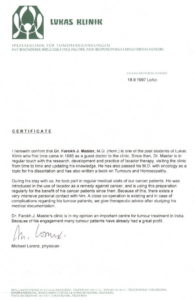
The Homoeopathic Department in Kamalnayan Bajaj Cancer Centre, Ruby Hall Clinic – Pune, was started in 2006 by Dr. Farokh Master.
Here, Dr. Master consults on cases of cancer and advanced pathology for patients residing in Pune and other suburbs of Maharashtra. He has successfully, through the years, managed to establish the imprint of Homoeopathy through the repeatedly positive results.
The department is open on the 1st and 3rd Saturday of every month, from 10am to 1pm. For appointments please contact the reception of Ruby Hall Clinic.
IASP is the leading professional forum for science, practice, and education in the field of pain. Founded in 1973, the association is governed by an international Council composed of officers and councillors elected by the membership.
Their mission is to bring together scientists, clinicians, health-care providers, and policymakers to stimulate and support the study of pain and translate that knowledge into improved pain relief worldwide.
IASP organises a World Congress of Pain biennially. It is an international multidisciplinary program that comprises workshops, poster sessions and refresher courses.
The 14th World Congress in Milan The 15th World Congress in Buenos Airies
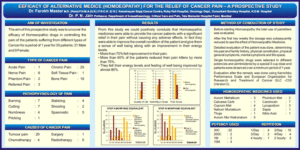
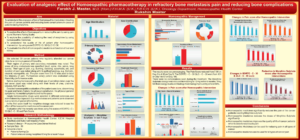
The 16th World Congress in Kyoto , Japan The 17th World Congress in Boston
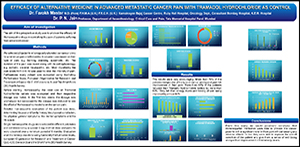
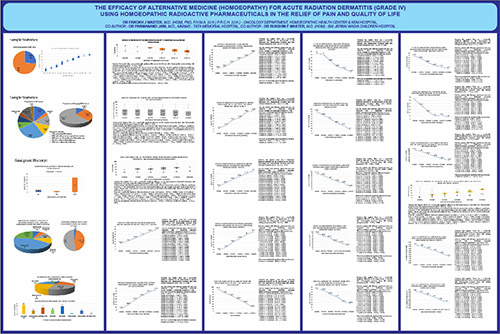
Some Important Facts about Cancer
To take a lesson from scripture, “Know thy self, know thy enemy.” To overcome cancer, you also must understand how your body works and how cancer works.
We all get cancer, every day.
Our cells constantly deal with stressors that cause genetic damage. It only takes one altered cell to potentially grow into cancer.
Weakened body defenses lead to cancer.
A healthy immune system protects us from altered cells by identifying and killing them before they become a threat. A weak immune system, on the other hand, allows cancer the time it needs to entrench itself and start multiplying.
Cancer is an evasive escape artist.
Even when the immune system is reasonably healthy, cancer can sometimes find a way to slip past our body’s roaming immune system sentinels.
Cancer does not happen overnight.
Poor nutrition, over-eating, lack of exercise, stress, inadequate sleep, exposure to environmental toxins, and emotionally traumatic episodes are all daily stressors that take a toll on our body’s resources. Over time, these can overwhelm the immune system and impair functioning.
Cancer grows from stem cells.
You can trace every cell in your body, including cancer cells, back to an extremely powerful cell called a stem cell. Stem cells have the genetic ability to multiply and transform into any kind of cell, making them very difficult to identify and kill. This is why chemotherapy and radiation often result in recurrence. Although these methods destroy a sizable tumor mass, studies estimate 1 in every 100 tumor cells is a stem cell that can easily survive and spread.
Healthy cells comprise a large part of tumors.
Malignant cancer cells are experts at “recruiting” surrounding healthy cells. They are not solely dependent on cell division among their own kind for growth. This allows tumors to develop much faster and makes them harder to target.
Cancer cells create environments unfavorable to healthy cells.
Cancer cells absorb sugar and other nutrients 10 times faster than healthy cells, outcompeting them. They also resort to a primitive form of food metabolism, creating an acidic environment and making them resistant to the natural process of cell death.
Understanding these basic roots and behaviors of cancer empowers you as a patient. Although we can’t reverse the clock on what has happened, by changing a few key habits we can restore your body’s environment to favor health and well-being.